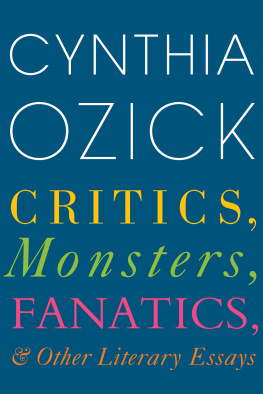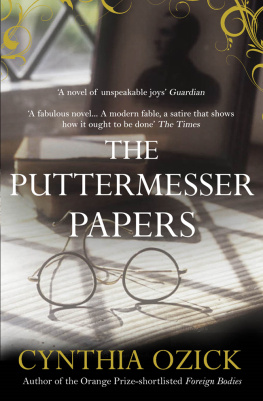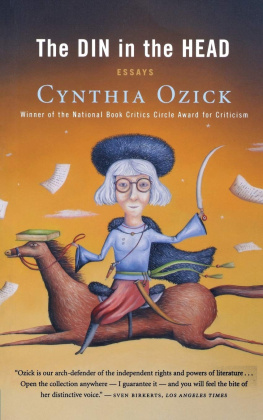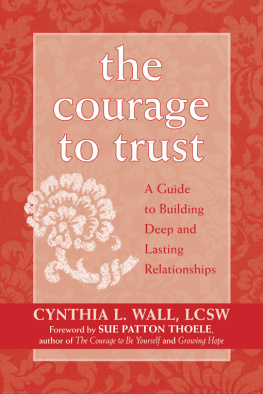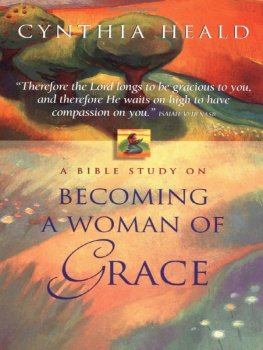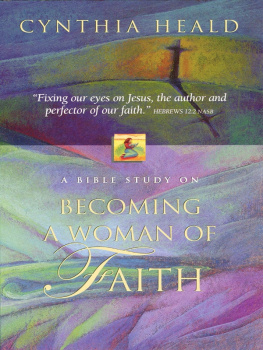A Mariner Book
Houghton Mifflin Company
Boston New York
First Mariner Books edition 2004
Copyright 1966 by Cynthia Ozick
Afterword copyright 2004 by Cynthia Ozick
All rights reserved
For information about permission to reproduce selections
from this book, write to Permissions, Houghton Mifflin Company,
215 Park Avenue South, New York, New York 10003.
Visit our Web site: www.houghtonmifflinbooks.com.
Library of Congress Cataloging-in-Publication Data is available.
ISBN 0-618-47051-4 (pbk.)
Printed in the United States of America
QUM 10 9 8 7 6 5 4 3 2 1
For My Mother and Father
"Everything is mine," said gold.
"Everything is mine," said iron.
"I'll buy everything," said gold.
"I'll take everything," said iron.
Aleksandr Pushkin
Offer the resourceful man one of two legacies: a mammoth trust fund by inheritance of wealth, or a minuscule fund of trust by inheritance of nature; and he will choose the one which least inhibits venturesomeness.
from the unpublished aphorisms
of Enoch Vand
Part One
AMERICA
1
After the exercises I stood in the muddy field (it had rained at dawn) and felt the dark wool of my gown lap up the heat and din of noon, and at that instant, while the graduates ran with cries toward asterisks of waiting parents and the sun hung like an animal's tongue from a sickened blue maw, I heard the last stray call of a buglesingle, lost, unconnectedand in one moment I grew suddenly old. All around, the purple-plumed band had broken ranks, making a bright dash for the cool of sugared grapes and lemonade on long tables under trees, and the members of the procession, doffing their hoods as they dispersed, raised in the air veils of blue, mauve, crimson, and jade, like the wings of geese. The bugle's voice unfurled, shivered, fell. Although I did not move and stopped my breath and hoped the wail would lift againwhy? as a signal perhaps, the witness we spend our lives waiting forit would not. Only the year before Enoch had told me that the sign of understanding would be the absence of any sign, that revelation came unproclaimed, that messiahship was secret; but Enoch was himself so abundant in signs, revelations, and messianism that, on the basis of his own doctrine, I did not believe him. Enoch would have said that because the bugle did not speak again its first utterance was also in doubt; after an hour of discussion he might even have convinced me that I had not heard a bugle at all, just as, in my childhood, he had once demonstrated that, since God had made the world, and since there was no God, the world in all logic could not exist. It was true; the world did not exist; Enoch was middle-aged, and knew.
After a while, because the bugle would not rise again, no longer expecting the sound of redemption I ceased even to hope for it and took of! my white shoes to save them from the mud and began to cross the field. The goal posts were hooks for garlands: flowers woven through wires had turned them into awnings, and gardenias clambered down the poles like breeding moths. It was late, the field was half-deserted, the gatemen had let the porters through; they came swarming after the camp chairs, shutting them with loud snaps and piling them, dozens high, in barrows. I passed under one of the goal posts and a pink flower, loosed from its plaiting, tumbled onto the sleeve of my gown. If another had fallen, and a third, or a rain of those fleshy petals, I might have been cheered, and willing to believe myself saved after all. But it was only a single one; already browning at the edges, the stem twisted dry, a tiny pale worm feasting in its eye; so I brushed it sadly away. A little girl ran to snatch it up, but when she saw how uglily it was blighted, she tossed it to the ground and challenged me with her contempt. "My sister's getting married tomorrow," she told me spitefully, and rubbed the bridge of her nose with an admirable gesture. Under the trees all the weddings of the world had coalesced, vapor into vapor. A straw pierced my stocking and stuck up through my toes while all the brides in their black cloaks embraced one another with green grapes between their teeth, and all the visitors applauded decorously, like Roman senators. There was a shimmer of mass marriages. To whom would they be wed, these nuns and sisters, these blooming abbesses? I knew at once, without speculation: to the world. From my sudden agedness, I looked out at them with envy in the marrow, because I was deprived of that seductive bridegroom, I alone was deprived of, his shining hair and the luster of his promised mouth. EnvyInvidia, they named it in a Latinist and sacramental ageought not to be accounted sinful, for sinning is what we do by intent, and envy, like the plague-fly, desires us against our will. I did not wish to envy them, I felt disgust for myself, but greed for the world had bitten me. I longed to believe, like these black-gowned brides, in pleasure, in splendor, in luck; in genius, in the future, most of all in some impermeable lacquer to enamel an endless youth.
The rows of chairs had all vanished by now; their sharp little feet had left pock-holes in the turf, and the grass, again revealed, looked less green than before, trampled and sparse everywhere. Already a crowd of servingmaids was removing the striped cloths from the refreshment tables, shaking off crumbs as deftly as mariners hoisting sails. The ceremony had long since ended, and now the celebrants were scattering at last, uncurling their make-believe diplomas and dropping them to the ground. The rolled paper sheets, blank as snow, covered the grass like wet laundryour real diplomas would come weeks later, routinely, anticlimactically, in the mail. Was there nothing that was not a fraud? Under the highest branches a gracile Puerto Rican, incarnation of some sacred cat, went from shade to shade spearing the blowy papers into a sack with the keen point of his gardener's pick, tilting at them as though they represented something more noble than merely garbage. He stabbed and stabbed with considerable rhythm, so I gave him my own document, still whorled and ribboned and like all the others utterly empty, to pierce. With the art of an islander, a born fisherman, he lungeda leg in the airand harpooned it for his crackling canvas bag; and from his fleshless smile, his broken golden teeth, his ruined and crooked Spanish, I took evidence of sham and imposture, deceit and hoax: he was not what he pretended, no brown joyful boy with paper-pick, but rather some principle of Time marking out his choices with a honeyed wand. When first Time makes himself known to us, it is not as that ancient progenitor who comes to announce that we are mortal, but inadvertently, accidentally, in a moment unforetold especially by himself; and we see him then in his everyday disguise, that of a young bridegroom, and he brings us then not death but recognition, and not the end of knowledge but its beginning; and he whispers, in a ruined and crooked Spanish, "fraud!"
No aunt, cousin, mother, sister, father had come to see the commencement of this strange diaspora. I surrendered the hired costume and went into exile alone. And when, approaching the graveled road, I put my shoes on and ventured through the gate of that place and from an open window heard the buglers in their locker-room blaring jazz, I could think only of the peril, falseness, and allure of the world. And I reflected mournfully how bitter it was to wear the face of youth, to be rooted among jubilants, to feign delights, and all the while to keep close that clandestine disenchantment, that private corrosion of illusion, which belong to the very old.
2
A few weeks after graduation my mother returned from Paris, bringing with her, as usual, a great many boxes of dresses. She kept me with her in her room as she displayed them to herself in front of her long mirror; and while I buttoned, hooked, and zipped, or was made to appraise hemlines and bodices, she gossiped persistently. Enoch had been delayed in Geneva by. the arrival of a Bulgarian, she explained. "We were about to take off, so I saw him only for a second, through the plane-window," my mother said. "He had a long brown beard, like a spy. It must have been fake. And he gave Enoch one of those polite continental kisses."
Next page

